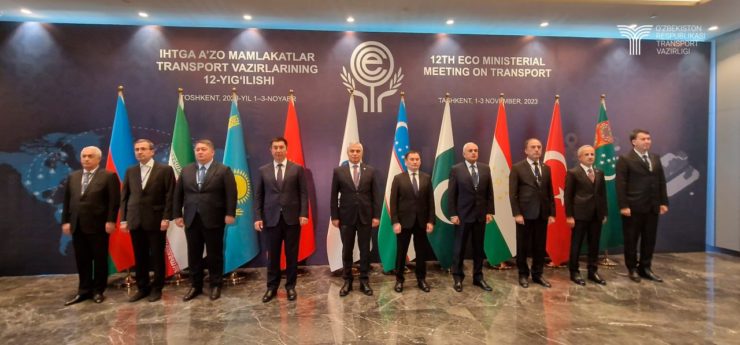
The signing of a protocol on the development of the international multimodal corridor Uzbekistan-Turkmenistan-Iran-Turkey by the participants was one of the outcomes of the Ministerial Meeting on Transport of the member nations of the Economic Cooperation Organization, which took place on November 3 of this year in Tashkent. The document outlines plans for organizing cargo transit from the Asia-Pacific region to Europe via the nations that make up the corridor and for setting up the right environment to increase cargo turnover amongst the four nations. When the project is completed, Central and East Asian nations will have access to the ports of the Mediterranean and the Black Sea, which will open up trade with North Africa, the Middle East, and Eastern, Southern, and Western Europe.
The recent progress in constructing the China-Kyrgyzstan-Uzbekistan railroad project, which was discussed during the China-Central Asia summit in the middle of this year, was certainly an encouragement for pursuing such a project. China undoubtedly has an interest in this project, and one of the most interesting expansions of it could be the railroad that is suggested under the ECO. The construction of railroads that will grant Turkey, Central Asia, and Transcaucasia access to the Persian Gulf ports via Iranian territory may proceed more quickly if this corridor is further developed.
Furthermore, several interesting transport and infrastructure projects in Central and South Asia were considered at the leaders of the ECO member countries’ discussions that followed the Ministerial Meeting on Transport. Specifically, Uzbek President Shavkat Mirziyoyev discussed the prospects for the construction of the so-called Trans-Afghan Railway at his meeting with Pakistani Prime Minister Anwar ul-Haq Kakar on November 8.
Although Afghanistan’s delegates have not taken part in the organization’s events since 2021, their involvement in regional and inter-regional infrastructure and transportation projects has not been canceled. Although strictly in a bilateral format, the interim Afghan authorities are still actively negotiating promising projects with individual ECO countries. In this regard, it seems important to note that high-level talks with the host country’s leadership were held in Kabul at the end of October this year, just before the actual ECO Summit. The meeting was intense in terms of both the number of participants and the agreements made. It was attended by the two countries’ ministers of investment, industry and trade, agriculture, water resources, mining and geology, energy, and transport. During the negotiations, the acting Deputy Prime Minister for Economic Affairs of Afghanistan stated that transport and transit issues are the engines of economic development, emphasizing his country’s keen interest in the establishment of new transport routes connecting Central and South Asia via Afghanistan.
Before the well-known political events in Afghanistan, which derailed the initial plan for the project, Uzbekistan, Afghanistan, and Pakistan signed a roadmap for the construction of the Trans-Afghan railway (Mazar-i-Sharif-Kabul-Peshawar) in 2021. However, the logic of the development of intra-continental interactions between different countries and peoples in the twenty-first century, from the Mediterranean Sea to the Arabian and Pacific Oceans, coupled with the epoch-making growth of land transport routes in Eurasia, did not allow this project to “sink into oblivion” due to internal political factors in one of the participating countries. Therefore, already in 2023, the parties have made great progress in reaching agreements on the implementation of the railway. According to preliminary project estimates, the line will be 573 kilometers long with a capacity of 20 million tons per year.
If the project is successful, a number of countries will have access to fundamentally new transportation routes, such as Central Asian countries distant from the sea, which will have effective access to Indian Ocean ports. The project is especially beneficial to Uzbekistan, which, in the context of the concurrent development of the China-Kyrgyzstan-Uzbekistan railway corridor project and the previously mentioned Uzbekistan-Turkmenistan-Iran-Turkey project, may become a crossing point for one of Eurasia’s most promising overland routes, linking north to south and west to east. In theory, Russia may benefit from the Trans-Afghan railway as well; the country already has access to Pakistan’s ports via Asian Highway 4 (AH4), which runs from Novosibirsk to Karachi. It has a much lesser capacity and a much longer length. China is not indifferent to the Trans-Afghan railway: this route may become extremely vital for China in terms of access to the Indian Ocean and the Persian Gulf, which is currently given mostly through the Strait of Malacca. The ongoing tensions between the PRC and the USA, as well as the PRC and India, may make it more difficult for Chinese vessels to use the strait routes. It is no accident that the Xi’an Declaration of the China-Central Asia Summit held in mid-2023, placed special emphasis on the China-Central Asia-South Asia and China-Central Asia-Middle East routes, as well as the city of Termez, through which the railway will go,
Thus, we can say with confidence that the development of intracontinental routes has advanced significantly during the ECO talks held in October and November of this year, which is advantageous for most Eurasian countries. However, many of the favorable conditions for this advancement have also emerged as a result of other continental processes: the “China-Middle Asia” format’s intensifying dialogue and Afghanistan’s gradual return to participation in international transportation and infrastructure initiatives following the 2021 events.
Boris Kushkhov, the Department for Korea and Mongolia at the Institute of Oriental Studies of the Russian Academy of Sciences, exclusively for the online magazine “New Eastern Outlook”.